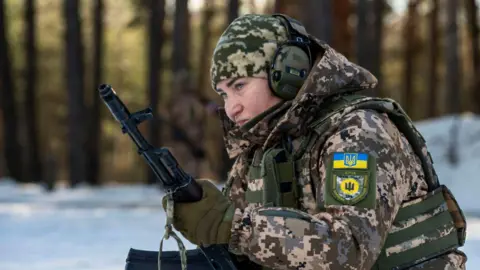UK announces further £450m military support to Ukraine
 Getty Images
Getty ImagesThe government has announced a further £450m of military support to Kyiv, as the UK and Germany hosted a meeting of 50 nations in Brussels.
Defence officials met to "pile pressure" on Russian President Vladimir Putin and force him to end his invasion of Ukraine, UK Defence Secretary John Healey said.
"We must step up to deter Russian aggression by continuing to bolster Ukraine's defences," he added.
The package includes funding for hundreds of thousands of drones, anti-tanks mines and and repairs to military vehicles.
About £350m will be provided by the UK, with extra funding from Norway via the UK-led International Fund for Ukraine.
The package includes £160m to provide repairs and maintenance to vehicles and equipment the UK has already provided to Ukraine.
A "close fight" military aid package, with funding for radar systems, anti-tank mines and hundreds of thousands of drones, worth more than £250m is also part of the package, the government said.
In January, the UK pledged £4.5bn in military aid to Ukraine - which Healey described as the highest contribution of aid to Ukraine this year. The £450m announced on Friday is part of that £4.5bn.
- Ukraine's long-range drones using Western tech to hit Russia
- How drones and the battle for Ukraine are changing the future of warfare
Speaking after a meeting of the Ukraine Defence Contact Group (UDCG), Healey said Ukraine's allies in total pledged €21bn (£18.2bn) in new military aid to the embattled nation - which he called a record boost in funding.
German Defence Minister Boris Pistorius, who co-chaired the meeting alongside Healey, said "major progress" was made.
He said Germany committed to providing an additional €11bn worth of aid to Ukraine until 2029.
"Peace in Ukraine appears to be out of reach in the immediate future," Pistorius said at a news conference.
"Russia needs to understand that Ukraine is able to go on fighting," he said, adding that Ukraine "can count on us" for support.
Last month, Sir Keir Starmer announced a £1.6bn missile deal for Ukraine, on top of a £2.2bn loan to provide more military aid backed by profits from frozen Russian assets.
The Lib Dems said the support package announced on Friday was "small change" and called for the government to seize Russian assets in Britain to give Ukraine more funding.
The UDCG had traditionally been hosted by the US defence secretary until Donald Trump became president in January. Since then, in a sign of the US stepping back from European security matters, Healey has taken over as chair.
Healey said US Defence Secretary Pete Hegseth did, however, attend Friday's meeting virtually, as did Ukrainian President Volodymyr Zelensky.
Asked by the BBC whether the US had the right priorities given Hegseth had not attended the meeting in person, Pistorius said it was "not a matter of priorities, it's a matter of schedules".
He added that as far as he was aware, Hegseth had just returned from a trip abroad and other ministers had also not been able to attend for similar reasons.
"The most important part was that he took part," he said.
"In the weeks to come, we will see what will happen with US participation and US support," Pistorius added, but said Europe should "take on more responsibility".
Ukrainian Defence Minister Rustem Umerov said the US remains his country's "prime partner" and it was still participating and "providing security assistance".
On Thursday, defence ministers from 30 countries in the "coalition of the willing" - a group of nations who have pledged to stand with Ukraine - met in Brussels to discuss installing a force in Ukraine to ensure enduring peace.
During that meeting, Healey said he did not envisage a peacekeeping force that would "separate the currently warring sides down the line of contact" but that bolstering Ukraine's armies would be a key part of the plan.
Kaja Kallas, the EU's foreign policy chief, said the role of a peacekeeping force in Ukraine needed to be discussed further.
Speaking to BBC Radio 4's Today programme, she said: "If we have such boots on the ground, so what is the goal? Are they monitoring, are they deterring, are they keeping the peace, are they fighting? I mean, what could be the goal? And that's not really clear."
Trump once said he would end the war in Ukraine in less than 24 hours, but so far, his attempts to stop the conflict have only resulted in limited success.
In March, Putin rejected Trump's call for an immediate and full month-long ceasefire - which Kyiv had agreed to - instead saying only that it would halt attacks on energy infrastructure.
Kremlin spokesman Dmitry Peskov said Trump's special envoy Steve Witkoff arrived in Russia on Friday, where he is set to meet Putin, according the TASS news agency.
The spokesman said the pair will discuss the conflict but warned not to expect "breakthroughs", state media reported.
Meanwhile, fighting between Ukrainian and Russian troops has intensified in the past week, according to Ukrainian military chiefs, who said assaults on the front line have increased by 30%.
It is thought these assaults are part of a spring offensive by Russia. Kyiv believes Moscow is preparing for a major renewed assault, with tens of thousands of troops believed to have gathered along the border with Ukraine.
Earlier this week, Zelensky publicly acknowledged for the first time that his troops are active in Russia's Belgorod region, bordering Ukraine. Ukrainian troops have also been fighting in Russia's Kursk region - though Russia has since retaken most of the territory.
